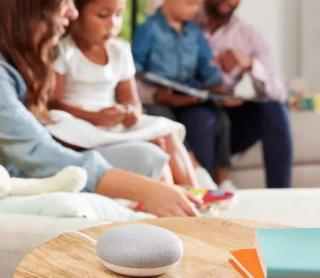Amazon Alexa: is it friends with your kids?

Image copyright
Google
Google Home is marketed as a family device.
The tech giants are racing to get digital assistants into our homes – the Amazon Echo Dot currently has a 40% discount during Amazon Prime Day – but debate rages over whether they are suitable for children.
There have certainly been teething problems.
Toy giant Mattel abandoned its “AI babysitter”, Aristotle, last year following privacy concerns.
And music streaming service Spotify is currently testing a way of filtering out songs with explicit lyrics following complaints from parents that family-friendly versions of tracks did not play by default when requested on smart speakers.
Amazon Echo meanwhile added a feature to encourage children to be more polite to it following concerns that the abrupt way in which people talk to it was teaching children to be rude.
Should children have their own smart speaker?
If you accept that voice-based tech is where our gadgets are headed, then there is an argument that children need to be familiar with it as it evolves.
Image copyright
Amazon
The Amazon Echo Dot Kids Edition comes in a range of bright colours
“Isn’t it a good thing if my sons are learning how to interact with these kinds of devices now to prepare them for whatever machines they’ll be speaking to as adults?” pondered tech journalist Stuart Dredge – while also conceding that he wants his children to do so while closely supervised by him, and that means not having one in their bedrooms.
Image copyright
Google
Google promotes family functions for the Google Home
However, when Amazon released a special version of the Amazon Echo aimed specifically at children in the US, the Campaign For a Commercial-Free Childhood issued a statement raising concerns about the device, accompanied by a letter to Amazon founder Jeff Bezos from two American politicians.
“Amazon wants kids to be dependent on its data-gathering device from the moment they wake up until they go to bed at night,” said campaign director Josh Golin.
“AI devices raise a host of privacy concerns and interfere with the face-to-face interactions and self-driven play that children need to thrive.”
Amazon responded that technology in general is “not designed to replace parenting or social connection”.
Do children think Alexa is a real person?
An MIT study from 2017 found that younger children were more likely to speak to digital assistants as if they were people, asking them things like what their favourite colour was and how old they were.
Image copyright
Getty Images
However they also tried to understand how they worked.
“Do you have a phone inside you?” and “what are you?” were notable questions.
The study concluded that the children believed they could teach the devices as well as learn from them – but it is worth noting that the research was never completed due to “lack of focus” (anyone with small children in their lives will sympathise) and was based on a very small group of 26 participants.
Interestingly, one of the five principles of robotics, drawn up by a number of academics, states that: “…anyone who owns or interacts with a robot should be able to find out what it really is and perhaps what it was really manufactured to do.”
Which means that nobody should believe that an artificial object is human – including children.
Do smart speakers make children rude?
If you spoke someone the way you speak to a smart speaker – Turn on the TV! Do it again! – you may not get a very polite response.
Image copyright
Getty Images
In 2016 venture capitalist Hunter Walk wrote a Medium post about the Amazon Echo which he described as magical, but added that it was adversely affecting his child’s behaviour.
The reason he gave was the lack of manners required to get a response.
“Cognitively I’m not sure a kid gets why you can boss Alexa around but not a person,” he wrote.
In January 2018, the research company ChildWise published a report warning that children who grew up accustomed to speaking that way to a virtual personality might become aggressive in later dealings with humans.
Amazon has since introduced a feature called Magic Word, which praises children for being polite.
Are smart speakers making children more impatient?
A recent study carried out at the University of Washington found that overall, the very small sample of children involved (there were just 14) were very patient with a range of digital assistants deliberately not understanding them.
Around 75% of the time they simply kept trying to make themselves understood – and the researchers noted that they used familiar tactics.
“Our results show that much of what is known about children’s linguistic behaviours in person-to-person communication applies to their interactions with these technologies,” they concluded.
